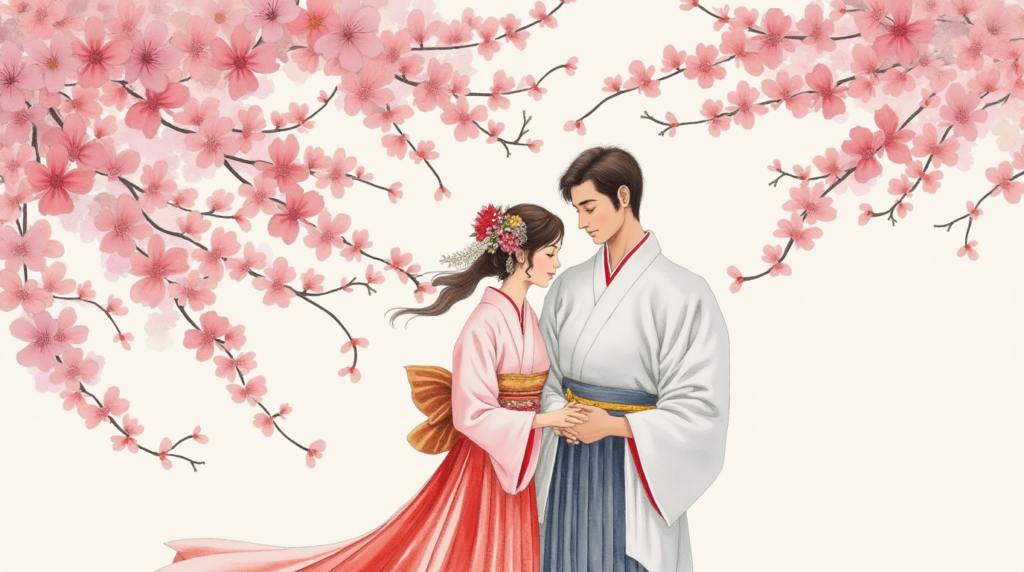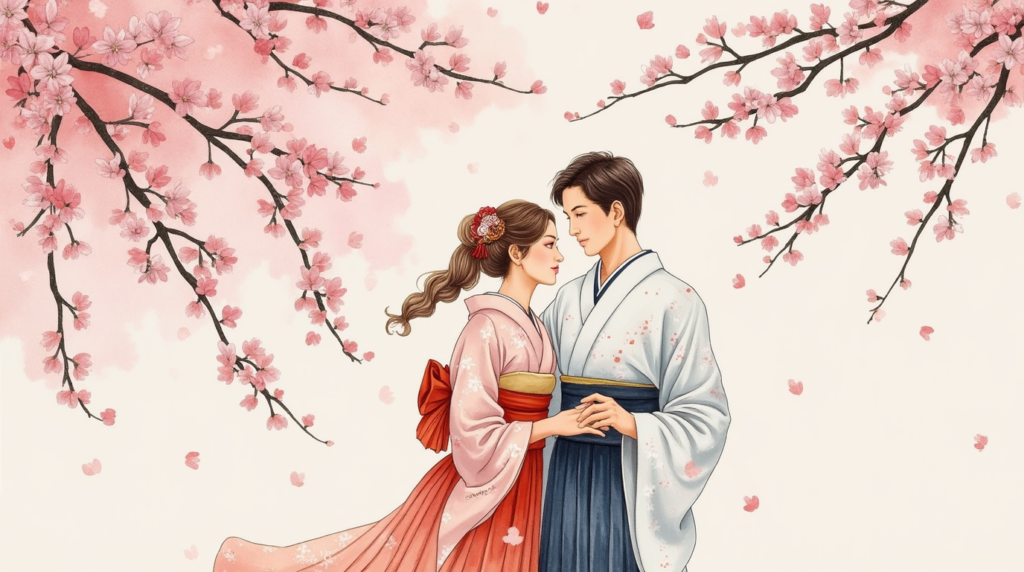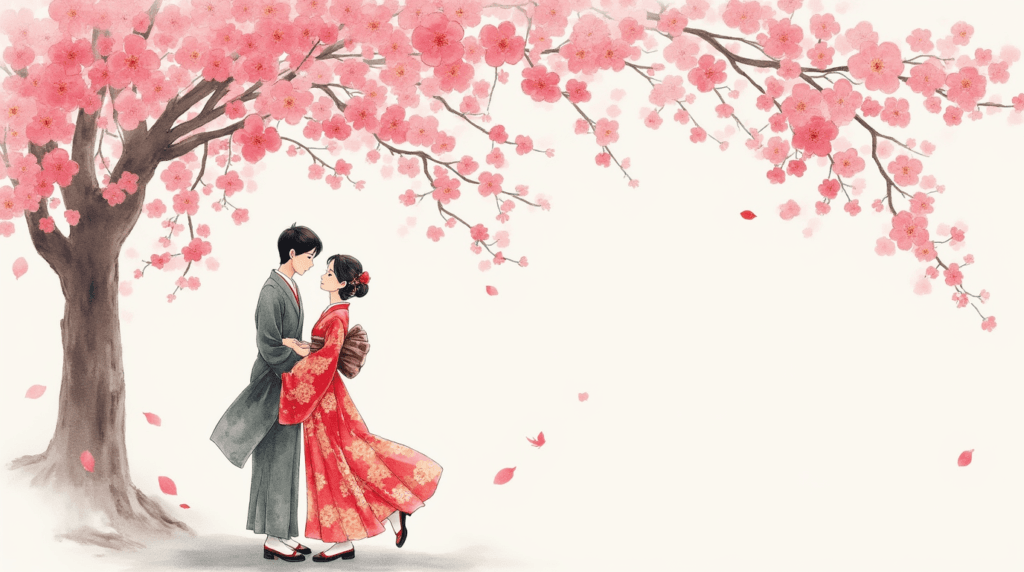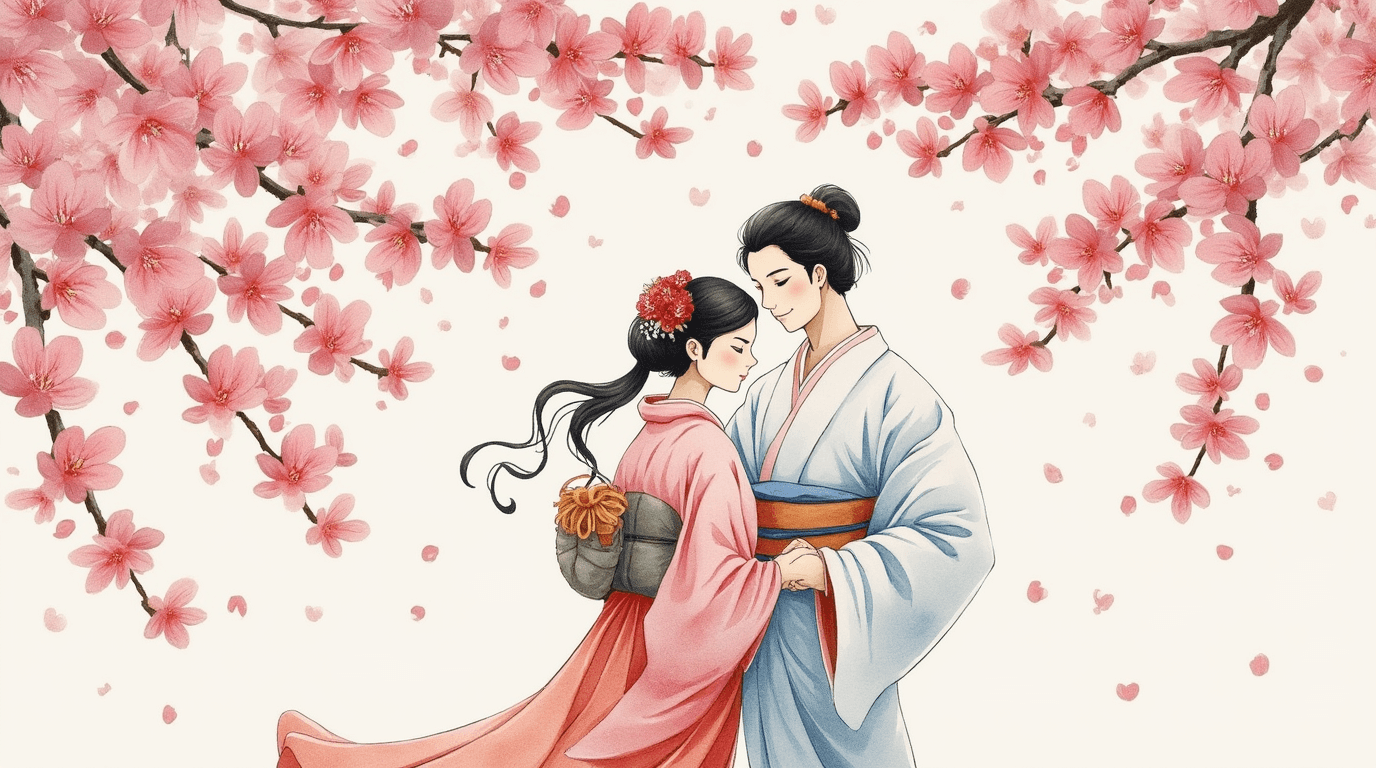Find Your Japanes Love Story: How?
Have you ever been captivated by a love story that felt different, imbued with a unique charm and depth? Perhaps you’ve watched anime, read manga, or even just caught glimpses of Japanese dramas and been struck by the way romance unfolds in Japan. It’s a world away from the often fast-paced, direct approaches you might be used to. Japanes love story, whether they’re blossoming in bustling Tokyo or serene Kyoto, carry a distinct flavor – a blend of ancient traditions and modern expressions that’s utterly enchanting.
Table of Contents
Maybe you’re curious about how love works in Japan. Perhaps you’re fascinated by the cultural nuances that shape relationships. Or maybe, just maybe, you’re dreaming of experiencing your own Japanese love story. Whatever your reason for being here, you’re in the right place. We’re about to embark on a journey to explore the captivating realm of Japanese romance. Forget the clichés; we’re diving deep into the heart of what makes Japanese love stories so special, so intriguing, and yes, so utterly romantic.
Get ready to discover the subtle art of courtship in Japan, the beautiful traditions that still hold sway, and the modern twists that are shaping love in the Land of the Rising Sun. This isn’t just about dating; it’s about understanding a whole different way of connecting, committing, and cherishing love. So, let’s begin, and together, we’ll unlock the secrets of the Japanese love story.
The Unique Essence of Japanese Romance: More Than Just Cherry Blossoms
What exactly sets a Japanese love story apart? It’s more than just picturesque landscapes and delicate cherry blossoms, though those certainly add to the atmosphere! The magic lies in a beautiful tapestry woven from cultural threads, unique communication styles, and deeply ingrained values. Let’s unravel some of these threads to understand what makes Japanese romance so distinctive.
Harmony and Respect: Building Blocks of Connection
In Western cultures, directness and assertiveness are often valued in communication. But in Japan, harmony (wa) and respect are paramount. This deeply influences how relationships begin and evolve. You’ll notice a greater emphasis on:
- Indirect Communication: Saying “no” directly can be considered impolite. Instead, you might encounter subtle cues, nuanced phrasing, and an emphasis on reading between the lines. This might sound complex, but it’s all about being considerate and avoiding confrontation. Think of it as a dance of understanding, where unspoken feelings often speak volumes.
- Key Point: Pay attention to non-verbal cues and subtle expressions. What isn’t said can be as important as what is.
- Emphasis on Politeness and Formality: Even in romantic settings, politeness remains crucial, especially in the early stages. Using honorifics, showing consideration for personal space, and being mindful of social etiquette are all signs of respect and genuine interest.
- Note: Don’t mistake formality for coldness. It’s a way of showing respect and building trust.
- Value of Patience and Gradual Progression: Relationships in Japan often develop at a slower, more deliberate pace compared to some Western cultures. There’s less pressure to rush into intimacy or declarations of love. Patience is seen as a virtue, and taking time to truly know someone is highly valued.
- Data Point: Studies suggest that Japanese couples tend to date for a longer period before marriage compared to some Western counterparts, highlighting this emphasis on gradual commitment.
The Power of Non-Verbal Communication: Kuki wo Yomu (Reading the Air)

Have you heard the phrase kuki wo yomu? It literally translates to “reading the air,” and it’s a cornerstone of Japanese communication. It means understanding the unspoken atmosphere and feelings in a situation. In romance, this translates to:
- Intuitive Understanding: Partners in Japanese relationships often develop a deep intuitive understanding of each other’s feelings and needs without constant verbalization.
- Shared Silence: Silence isn’t awkward; it can be comfortable and meaningful. Enjoying quiet moments together is a sign of closeness and understanding.
- Subtle Gestures: Small, thoughtful gestures often carry more weight than grand pronouncements. A carefully chosen gift, a helpful act, or simply being there for someone can express deep affection.
Family and Social Harmony: Considering the Bigger Picture
In many Japanese love stories, the concept of family and social harmony plays a significant role. While individual desires are important, there’s also a consideration for how a relationship fits into the broader social fabric. This might involve:
- Family Acceptance: While not as rigid as in the past, family opinions can still hold weight. Seeking approval, or at least understanding, from family members can be important, especially for long-term commitments.
- Social Compatibility: Consideration might be given to social standing, career compatibility, and how a partnership might be perceived within their social circles. This isn’t about being materialistic; it’s about ensuring a harmonious fit within their community.
Exploring the Spectrum: From Traditional to Modern Japanese Romance
Japanese love stories aren’t monolithic. Just like anywhere else, romance in Japan is diverse and evolving. You’ll find a fascinating blend of traditional practices and modern dating trends. Let’s explore some of the different types of love stories you might encounter in Japan:
Omiai: The Traditional Path – Arranged Meetings with a Modern Twist

- What is Omiai?Omiai is a traditional matchmaking process where families introduce potential partners to each other. It’s often misunderstood as forced marriage, but in modern Japan, it’s more accurately described as an arranged meeting. Both individuals have the freedom to decide if they want to pursue a relationship.
- Note: Omiai is less common among younger generations but still exists, especially for those seeking a more structured and family-approved path to marriage.
- How it Works: Families, often with the help of a matchmaker (nakodo), exchange profiles and photos of suitable candidates. If there’s mutual interest, a formal meeting is arranged, often in a refined setting like a hotel lobby or traditional restaurant.
- Modern Omiai: Today, Omiai can also be initiated by individuals themselves, sometimes with the assistance of online services or matchmakers who specialize in this traditional approach. It’s a way for people who are serious about marriage to find partners with similar values and intentions.
Modern Dating Apps and the Rise of Casual Encounters?
Just like globally, dating apps have become incredibly popular in Japan. They offer a convenient way to meet people, especially in busy urban centers.
- Popular Apps: Tinder, Pairs, Omiai (yes, the same name, but often a different focus), and other Japan-specific apps are widely used.
- Dating Culture Shift? While traditional values still influence dating, dating apps are arguably contributing to a shift towards more casual dating, especially among younger generations in cities. However, the underlying desire for meaningful connection remains strong.
- Navigating Dating Apps in Japan: Be mindful of cultural differences in communication styles and expectations when using dating apps. Politeness and respect are still key, even in the online world.
Workplace Romance: A Common Starting Point
The workplace is a significant social sphere in Japan, and it’s a common place for relationships to blossom.
- Shared Experiences: Working together creates opportunities for bonding over shared goals, challenges, and daily routines.
- Nomikai and Social Events: Company social events, like nomikai (drinking parties), can provide more relaxed settings to get to know colleagues on a personal level.
- Work-Life Balance Challenges: Japanese work culture can be demanding, which can impact relationships. Finding time for each other outside of work can be crucial for nurturing romance.
Long-Distance Love: Bridging Geographical Gaps
With globalization and increased mobility, long-distance Japanese love stories are becoming more common. This could involve:
- International Couples: Relationships between Japanese individuals and people from other countries.
- Domestic Long-Distance: Partners living in different cities or regions within Japan, often due to work or study.
- Technology as a Bridge: Video calls, messaging apps, and social media play a vital role in maintaining connection and intimacy across distances.
Intercultural Romance: A Blend of Worlds
- Unique Dynamics: Intercultural Japanese love stories are particularly fascinating, as they involve navigating not only personal differences but also cultural nuances in communication, values, and expectations.
- Mutual Learning and Growth: These relationships can be incredibly enriching, offering opportunities for both partners to learn about each other’s cultures and broaden their perspectives.
- Challenges and Rewards: Intercultural relationships can face unique challenges, such as language barriers, cultural misunderstandings, and differing family expectations. However, the rewards of building a life together across cultures can be immense.
Embarking on Your Own Romantic Journey in Japan
So, you’re intrigued by the idea of a Japanese love story and wondering if it’s something you could experience yourself? The answer is a resounding yes! Whether you’re living in Japan, planning a trip, or simply connecting with Japanese people online, there are ways to open yourself up to the possibility of romance.
Immersing Yourself in Japanese Culture: The First Step

Understanding and appreciating Japanese culture is fundamental to building meaningful connections.
- Learn Basic Japanese: Even a few basic phrases can go a long way in showing respect and willingness to connect. It opens doors and demonstrates genuine interest.
- Resource Tip: Consider using language learning apps like Duolingo or Memrise, or taking introductory Japanese classes online or in your community.
- Explore Japanese Customs and Etiquette: Familiarize yourself with basic Japanese etiquette, such as bowing, removing shoes indoors, and understanding personal space. This shows you’re respectful and considerate.
- Key Point: Small gestures of cultural awareness are highly appreciated and can make a significant positive impression.
- Engage with Japanese Media and Arts: Watch Japanese films, anime, dramas, listen to Japanese music, and explore Japanese literature. This helps you gain insights into Japanese values, emotions, and cultural narratives around love and relationships.
Meeting People in Japan: Creating Opportunities
If you’re in Japan, or planning to visit, here are some ways to meet people:
- Language Exchange Events: These are great for meeting both Japanese people interested in practicing English and other foreigners. They provide a relaxed and casual setting for conversation and connection.
- Tip: Search online for “language exchange Tokyo” (or the city you’re in) to find local events.
- Interest-Based Groups and Clubs: Join groups or clubs based on your hobbies, such as hiking, photography, cooking, or anime. Shared interests are a fantastic foundation for building friendships and potentially more.
- Cultural Events and Festivals: Attend local festivals (matsuri) and cultural events. These are vibrant and social occasions where you can meet people in a fun and engaging environment.
- Online Communities and Meetups: Utilize online platforms and social media groups to connect with Japanese people who share your interests or are open to meeting new people.
Online Dating in Japan (If You’re Not Physically There)
If you’re not currently in Japan but are interested in meeting Japanese people, online dating can be a viable option.
- Choose the Right Platforms: As mentioned earlier, apps like Pairs, Omiai, and even international platforms like Tinder are used in Japan. Research apps that cater to your relationship goals.
- Be Clear About Your Intentions: Be upfront about what you’re looking for – whether it’s friendship, language exchange, or a romantic relationship. Honesty is always appreciated.
- Cultural Sensitivity Online: Remember to apply the same principles of politeness and respect in your online interactions as you would in person.
Navigating the Dating Process: Understanding the Pace
Remember that Japanese love stories often unfold at a different pace.
- Patience is Key: Don’t rush things. Allow time for friendships to develop and for deeper feelings to emerge naturally.
- Subtle Expressions of Interest: Look for subtle signs of interest rather than expecting grand gestures early on. A consistent effort to spend time with you, thoughtful messages, or small acts of kindness can be significant indicators.
- Confession (Kokuhaku): In Japanese dating culture, a “confession” (kokuhaku) is often a crucial step. This is where one person explicitly expresses their romantic interest and asks if the other person feels the same way and would like to start dating exclusively. It’s a more formal step than simply “going on dates” in some Western cultures.
- Note: Don’t be afraid to initiate a kokuhaku if you feel a strong connection and sense mutual interest, but ensure you’ve built a foundation of friendship and understanding first.
Frequently Asked Questions About Japanese Love Stories
Have more questions about Japanese love stories and romance in Japan? Let’s address some common queries:
Q: Is dating in Japan really different from dating in my country?
A: Yes, in many ways it can be! Cultural values, communication styles, and societal expectations all contribute to a unique dating landscape in Japan. Emphasis on politeness, indirect communication, and a slower pace are key differences you might notice.
Q: What is kokuhaku, and is it important in a Japanese love story?
A: Kokuhaku is a “confession” of romantic interest. It’s often a crucial step in starting a relationship in Japan. It’s a more formal declaration of wanting to date exclusively and signals a serious intention to pursue a relationship.
Q: Are Japanese people shy when it comes to romance?
A: While generalizations can be misleading, indirect communication and emphasis on politeness can sometimes be perceived as shyness. However, it’s more about expressing feelings in a culturally appropriate way rather than a lack of feeling.
Q: What are some good Japanese dating apps to try?
A: Popular dating apps in Japan include Pairs, Omiai, Tapple, and Tinder. Research apps to find one that aligns with your relationship goals and preferences.
Q: How important is family approval in Japanese relationships?
A: While less rigid than in the past, family opinions can still hold some weight, especially for more traditional families and for long-term commitments like marriage. Showing respect for family is generally appreciated.
Q: Can foreigners experience a Japanese love story?
A: Absolutely! Many foreigners have found love and built fulfilling relationships with Japanese partners. Cultural understanding, open communication, and mutual respect are key to navigating intercultural romance.
Q: What’s the best way to show someone I like them in Japan?
A: Subtle gestures of kindness, thoughtful gifts, consistent effort to spend time together, and showing genuine interest in their life and culture are all effective ways to express interest. Directness can be appreciated, but gentleness and consideration are always valued.
Embrace the Enchantment: Your Own Japanes Love Story Awaits
The world of Japanese love stories is a captivating blend of tradition and modernity, subtlety and depth, and a unique emphasis on harmony and respect. Whether you’re drawn to the gentle pace of courtship, the importance of non-verbal communication, or the rich cultural tapestry that shapes relationships in Japan, there’s a profound beauty to be discovered.
Hopefully, this journey into the heart of Japanese romance has sparked your curiosity, broadened your understanding, and perhaps even inspired you to explore your own romantic possibilities in this enchanting culture. Remember, like any love story, a Japanese love story is about connection, understanding, and cherishing the unique bond you share with another person.
So, are you ready to embrace the enchantment? Perhaps your own Japanese love story is waiting to unfold. Take what you’ve learned, be open to new experiences, and who knows what beautiful connections you might forge.
Now, we’d love to hear from you!
- Have you ever experienced or witnessed a Japanese love story? Share your thoughts or experiences in the comments below!
- What aspect of Japanese romance resonates most with you?
- If you’re interested in learning more, what other questions do you have about dating and relationships in Japan?
Let’s continue the conversation and explore the fascinating world of Japanese love stories together! And if you found this article insightful, please share it with anyone who might be captivated by the magic of romance in Japan. Happy exploring!

